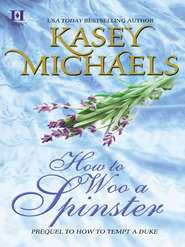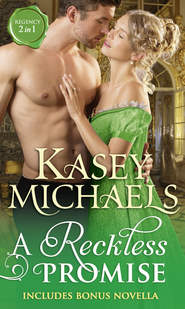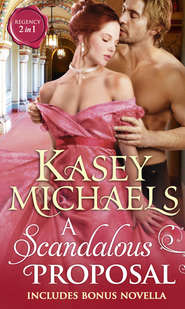По всем вопросам обращайтесь на: info@litportal.ru
(©) 2003-2025.
✖
How to Beguile a Beauty
Настройки чтения
Размер шрифта
Высота строк
Поля
The moment was a picture, really, a fine portrait set into motion. Adventure Awaits would make a fine title. Especially if the artist could capture the laughing Lady Nicole Daughtry, her bonnet discarded so that the sun fell fully on her face, as if the gods themselves had wished a closer look at her fresh, young beauty. Leaning rather precariously out the off-window, she continued to wave and blow exuberant kisses back toward the mansion until the coach reached the end of the Square and disappeared from sight.
And that was that. There was nothing more to see. Even the sun, which had deigned to appear amidst a Season noted most for damp and rain, withdrew behind a cloud, and the world turned grey once more.
Lady Lydia Daughtry pushed down the sash and backed away from the window on the second floor of Ashurst House to seat herself on the tufted light blue velvet padded bench in front of her bed. She sat with her back ramrod straight, her hands, else they tremble and betray her, neatly folded in her lap. Another portrait, yes, but one entirely without the fire and light she had just witnessed. After a few minutes of thus imitating a statue, she quietly sighed, her bosom rising and falling almost dramatically, before she resumed her quiet, even breathing.
To the casual observer, she was, as always, an island of calm. No one would think that her heart was pounding furiously, or that she felt perilously close to indulging in what her former governess would have condemned as a tantrum.
Not that the Lady Lydia ever had tantrums (if you threw something fragile against, for instance, a nearby wall, and it broke, you’d only have to clean up the pieces. So, really, what was the point?).
Her twin, however, the newly absent Lady Nicole, had manufactured any number of tantrums as a young child. The most memorable remained the last, the day their mother had wed her third husband and then immediately shuffled off her three children once more to Ashurst Hall. Children were not, it seemed, important once there was a new man in Helen Daughtry’s life. But if Nicole wasn’t to be deemed important, she would at least be noticed, most especially when she’d loosed a heavy silver vase at her new stepfather’s head.
The man really should have ducked.
Lydia smiled at the memory. Nicole did, with such marvelously dramatic flair, all the things the stick-in-the-mud, cautious Lydia only dreamt of doing.
And now Nicole was gone. Her sister, her twin, her heart-mate, was off on her way to meet the mother of her fiancé, Lucas Paine, the Marquess of Basingstoke. And life for neither Lydia nor Nicole would ever be the same.
Lydia had never in her eighteen years known a day without Nicole by her side. The laughing Nicole. The adventurous Nicole. Nicole, who could find excitement anywhere, and manufacture some on her own if none was to be found.
In the Ship of Life for the twins, Nicole had been the wind in the sails. Lydia, as she often thought of herself, had been the anchor. Her sister had pooh-poohed that, saying Lydia was the rudder, the one who steered them both along the straight and narrow and kept Nicole from making an entire cake of herself with her mad starts. But Lydia knew that Nicole was only being kind.
Because, as everyone else well knew, there wasn’t an ounce of excitement in Lady Lydia Daughtry’s entire body. She was quiet, pleasant, obeyed all the rules, never caused anyone so much as a modicum of trouble. To her own mind, she imagined doorstops were more adventuresome. And definitely more interesting, even if the only time anyone noticed one of them was when they tripped over them and stubbed their toes.
When Nicole was in the room, nobody noticed Lydia. Her sister’s wide smile, glorious dark hair, shining eyes, infectious laugh and, well, rather luscious body, drew all attention. Even her freckles were exciting. Leaving the slim, blond, blue-eyed Lydia to rather fade into the wallpaper. And that was precisely how Lydia liked it.
But now her shield was gone.
She’d known this day would arrive at some point. But then steady, older, gentle Captain Swain Fitzgerald would have been her protector, her safe harbor.
Except that Captain Fitzgerald had perished at Quatre Bras a year earlier, his death devastating her because she’d loved Fitz with all of her young heart, yes, but also in ways her family would never understand. She’d thought that with her captain she’d found the answer to never having to leave her cocoon of shyness to face the world alone.
Proving to herself that she was something no one had ever suspected of her. She was extremely selfish. Perhaps she hadn’t deserved the captain’s love and devotion.
If she were a more dramatic sort, she might even believe that God had punished her selfishness by taking the captain from her. But Lydia was also intelligent, and she knew that God would not allow one person to die in order to teach another person a lesson.
Still, as time passed, nearly a year now since the captain’s death, doubts about her love for the man had begun to creep into her brain during quiet moments. How much had she really loved him? How much had she loved the idea of love…of being always safe, protected? She’d been only seventeen. Even the captain, in his letters to her, had warned her of her youth, and promised that he would court her slowly once he’d “put Boney back in his cage.”
For most of her young life she and Nicole and their brother, Rafe, had been shuffled back and forth between their home at Willowbrook to the late duke of Ashurst’s estate—depending on their mother’s mood and marital status. Nicole had made her feelings plain on the subject of their nomadic existence. Rafe had gone off to fight Napoleon, kicking the dust of both estates off his boots until finally returning home to learn that his uncle and cousins had died, and he was somehow now the duke himself.
And Lydia? She had never complained. She’d hidden in books, and behind Nicole’s warming fire. But that didn’t mean she hadn’t felt the pain of being less than well-loved by her mother, and merely tolerated by her uncle and cousins.
So, yes, she had been drawn to the captain, Rafe’s good friend and fellow soldier. He’d been older, wiser, tall and strong and solid, and he’d seen past her quiet exterior and found something about her that he’d liked. That he’d loved. It had been impossible not to love him back.
Together, they would have been happy for all of their lives.
She blinked away the tears that stung at her eyes. He’d loved her. She’d loved him. She could not, would not forget that one real truth, no matter how her mind sometimes plagued her. And she would never forget Captain Swain Fitzgerald, not ever. She may have learned to live without him over this past year, but then she’d had Nicole ever by her side, hadn’t she?
Lydia didn’t want the world the way Nicole did. She didn’t smile easily, didn’t trust often; she preferred to hide in books…and behind the effervescent Nicole, living vicariously through her outgoing twin.
Now she would face the world alone. It was a daunting, if not even terrifying thought for someone of Lydia’s quiet sensibilities.
She longed to leave London, leave the Season, to escape back to Ashurst Hall and a quiet life. But Rafe was the duke now, and he still had business in the city, so they would not return to his estate until after the King’s birthday in June at the earliest. He was much too busy to devote his precious free evenings to squiring her about Mayfair. His wife, Charlotte, carrying their first child, did not go into Society. Lydia’s once-again widowed mother had set sail for Italy, fleeing from yet another of her romantic indiscretions…and now Nicole was lost to her.
How was she to go to balls and routs and musical evenings accompanied only by her chaperone? Mrs. Buttram would go off to natter with the other paid chaperones, and Lydia would be left to sit against the wall with all the other overlooked debutantes, all the desperate, reaching females tossed into the Marriage Mart with the mission of securing a rich or at least titled husband.
The heat, the cloying smell of too many hot-house blooms, too many unwashed or overly perfumed bodies. The ignominy of a nearly blank dance card, the occasional turn around the room with either some bored young lord on orders from his mama to squire a few of the wallflowers, or a crass inquisition from some adventurous fortune hunter who asked pointed questions about her dowry.
The thought alone was enough to make Lydia feel physically ill.
Of course, she could always count on Tanner Blake, the Duke of Malvern, to dance with her at least once an evening. It had been His Grace who had brought them the news about Captain Fitzgerald the preceding spring. It had been His Grace whom Lydia had condemned as a liar, his broad chest the one she had beat her fists upon in a terrifying burst of raw emotion, hating him for the words he spoke, struggling to be free of his strong arms, his attempts to comfort her as her world, all her dreams, shattered.
She hadn’t been fair to the man. Lydia knew that. She had blamed him, blamed the messenger. Ever since that horrible day, ashamed of her unseemly hysterical outburst, she had tried her best to avoid the duke if at all possible. A return to Ashurst Hall had given her time and space, away from the duke. Long months during which she’d hoped he would forget her outburst, forget her.
Except that the man wouldn’t go away. Ever since they’d all come back to town for another Season, even now, as he seemed to be mere days from announcing his betrothal to his third cousin, Jasmine Harburton, he remained a frequent visitor in Grosvenor Square.
And Lydia knew why.
The captain had been his friend; he’d said he wished for Lydia to be his friend. Tanner Blake’s persistence had won out over her embarrassment, and her normal clear-headedness had replaced her irrational dislike for the man. For that alone, she was grateful to the healing powers of time and distance. But why hadn’t he simply now told her the truth? That the captain, as he lay dying, had asked him to “take care of my Lyddie.”
How terrible to force a man into agreeing to such an obligation. Yet how much worse it was to be that obligation. She believed the duke saw her as an object of charity, deserving of sympathy, which also forced her into the role of a young woman still daily, actively, grieving her lost love. Even as she hoped, prayed, she could leave this limbo she had existed in for the last year, with the captain still always alive in her heart, but as a cherished memory rather than a constant ache.
The Duke of Malvern was a good man. An honorable man. But did he ever see her as anything other than an obligation? And why was it becoming increasingly important to her that he think of her only as Lydia, and not some appendage to the past?
That was a question she couldn’t even have asked of her twin.
There was a knock on Lydia’s bedchamber door, and she quickly wiped at her damp cheeks as she called out, “Yes, please come in.”
Charlotte Daughtry, Duchess of Ashurst, looking young and slightly flushed in the London heat as she carried around a belly that seemed to increase daily, entered the room, her head tipped to one side as she looked at Lydia. “I thought I’d give you some time by yourself. She’s really happy, sweetheart. Be happy for her.”
“I am,” Lydia said sincerely, getting to her feet and accepting Charlotte’s hug. “Lucas adores her, and she him. But I will miss her.”
Charlotte idly rubbed at her perfectly round belly. “We’ll all miss her, but it isn’t as if she’s gone to the ends of the earth. She and Lucas will be coming to Ashurst Hall in July, to see her new niece or nephew—please God, the babe will have arrived by then—and also so that we can make plans for the wedding. By the way, it will be your job to talk her out of arriving at the church on horseback, with some of the little girls from the village prancing along ahead of her, streamers in their hair, tossing rose petals. Lucas, I’m afraid, is so besotted he’d grant her anything.”
Lydia smiled even as she blinked away fresh tears. She loathed feeling like a watering pot; she’d always been so careful to hide her emotions, especially the stronger ones, which tended to frighten her. “Actually, I think that would be very nice. Very…Nicole.”
“Don’t tell Rafe, but I agree. Oh, speaking of Rafe, he’s downstairs with our friend Tanner, who has come to take you for a drive on this unusual warm day in dreary London. It’s so lovely to see the sun, even when it plays hide-and-seek with us as it is today. Honestly, the only reason I came upstairs instead of leaving you some time to yourself was to tell you about Tanner’s offer. Not only am I as big as two houses, I may be turning senile. At any rate, Tanner somehow knew Nicole was leaving today, and thought he’d bear you company. Such a wonderful friend, isn’t he? So you go fetch your bonnet and pelisse, and I’ll tell him you’ll be down directly.”
Lydia nodded, finding it difficult to speak, holding in her sigh until Charlotte had quit the room.
Was this to be her life for the remainder of the Season?
Charlotte and Rafe happily married; kind, caring, but also very much wrapped up in each other. Captain Fitzgerald, irrevocably lost to her. Nicole, her very best friend, off on a new adventure in her life.
And Tanner Blake, the man she’d initially taken in such dislike through no fault of his own, the man who still seemed so doggedly determined to live up to his promise to his friend Fitz, could soon be married as well, with a whole new set of obligations.
Why, were she the dramatic sort, she would say that she was alone in the midst of a multitude, which was not a very pleasant place to be.
“If the exercise weren’t so fatiguing,” she told herself, “I should most probably throw myself to the floor and drum my heels against the carpet. Nicole always vowed it made her feel better. But I’m much too polite and restrained and civilized. Much too dull and boring. No wonder I sit with the desperate wallflowers. I may as well be invisible. Then again, if my inside were on my outside, if I were to act as I think and damn the consequences, like Nicole, I should probably shock everyone to their cores, including myself.”











